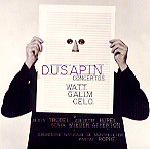The cover photo refers to the disc’s final work, Celo, whose title derives from a Cicero quote about the human face masking pain. But the graphic concept misfires; to those that haven’t read the booklet notes, the antic cover raises misleading expectations of madcap, fun pieces. They’re not. These three concertos are packed with a range of emotions not hinted at by the silly cover art. Watt, for example, is a trombone concerto that opens with an anguished cry and ends in desolation, while both Galim and Celo have grim funereal aspects. All display Dusapin’s emotional directness and inventive exploration of instrumental textures and colors. The typically avant-garde titles of the works, along with Dusapin’s micro-tonal investigations and links to Xenakis and to IRCAM, hardly prepare you for the expressiveness, lyricism, and even the sybaritic aural pleasures offered by this disc.
Watt derives its name from Samuel Beckett’s novel. A 17-minute work in one movement divided into three sections, it’s brilliantly performed by its dedicatee, Alain Trudel. After the dramatic opening, the trombone’s eventful flights are matched and supported by the active percussion section, imitative brass, and echoing strings. Shortly before the half-way point, the soloist sings a lugubrious tune into the instrument’s mouthpiece, shadowed by a ghostly piccolo. It’s a poignantly evocative passage that wrings maximum emotional impact from minimal resources. A bit later the soloist switches to the mellower alto trombone that sings sweetly before reverting to its despairing sololiquy. In the last section the piccolo’s high wail is joined by the lower strings and the trombone’s deep bass notes, ultimately melting into a duet between the other-worldly piccolo at its highest range and the trombone at its lowest, ending with the trombone’s final sigh.
Galim is a nine-minute concerto for solo flute and 25 strings. An austerely beautiful work with hints of an “Oriental” flavor in the flute line, it packs a lot into its brief span, most movingly in a brooding coda whose mournful strings are pierced by the flute’s disjointed interjections until the soloist falls silent and cello and bass mourn quietly. At 23-plus minutes the Cello Concerto (Celo) is the longest piece on the disc. Its title is both a pun on “cello” and a reference to that Cicero quote about keeping pain silent. The opening cello monologue exquisitely expresses that feeling of controlled pain with long pauses and grieving phrases. The second movement opens with a restrained orchestral outburst and features the cello’s highest register in a grim sololiquy, its melismatic singing somewhat reminiscent of Bloch’s Schelomo. In the third movement the cello’s lament struggles against forceful rhythmic strings and wailing winds, and a captivating long, slow coda culminates in a dramatic orchestral outburst that ends almost as quickly as it begins–an abrupt close to a powerfully dramatic work. The dedicatee and soloist, Sonia Wieder-Atherton, plays with impressive depth of tone and all the virtuosity you could ask for.
All of the works are played with a sense of occasion and with a firm grip on Dusapin’s highly individual style by Pascal Rophé and his Montpelier Orchestra. The engineering captures the proceedings with vivid, detailed realism. Even the booklet notes are informative. This is a disc to treasure.
































